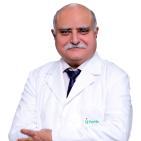
How To Prevent Heart Attack
A heart attack happens when a part of the heart doesn't get enough blood. Our hearts need a constant supply of blood to keep pumping properly. When one of the blood vessels that carries blood to the heart gets blocked, usually because of a buildup of stuff called plaque, it can stop the blood from getting through. When the heart doesn't get enough blood, it can't get the oxygen and nutrients it needs. This can cause the heart muscle to get damaged or even die, which is what we call a heart attack.
Preventing a heart attack means taking good care of your heart so it stays healthy and strong. Preventing heart attacks often involves making significant lifestyle changes and adopting healthy habits. Here are some key steps you can take to reduce your risk:
1. Quit Smoking:
If you smoke, quitting is one of the most important steps you can take to protect your heart. Smoking damages your blood vessels and increases the risk of heart attacks.
2. Maintain a Healthy Diet:
- Eat a diet rich in fruits, vegetables, whole grains, and lean protein
- Limit saturated fats and trans fats found in fried and processed foods
- Control portion sizes and monitor calorie intake to maintain a healthy weight
3. Exercise Regularly:
- Aim for at least 150 minutes of moderate-intensity aerobic exercise or 75 minutes of vigorous-intensity exercise per week
- Incorporate strength training exercises into your routine.
4. Maintain a Healthy Weight:
Achieving and maintaining a healthy weight can reduce the strain on your heart and lower the risk of heart disease.
5. Manage Stress:
Stress can contribute to heart disease. Practice stress-reduction techniques like meditation, deep breathing, or yoga.
6. Limit Alcohol Intake:
If you consume alcohol, do so in moderation. Limit your intake to one drink per day for women and up to two drinks per day for men.
7. Control High Blood Pressure:
Monitor your blood pressure regularly and follow your healthcare provider’s recommendations for managing hypertension.
8. Manage Diabetes:
If you have diabetes, work with your healthcare team to keep your blood sugar levels in check through medication, diet, and exercise.
9. Lower Cholesterol Levels:
Follow a heart-healthy diet to reduce LDL (“bad”) cholesterol levels. Consider medication if prescribed by your healthcare provider.
10. Get Regular Check-ups:
Visit your doctor for regular check-ups and screenings to monitor your heart health.
11. Limit Salt Intake:
Reducing sodium in your diet can help control blood pressure. Avoid excessive salt in processed and restaurant foods.
12. Stay Hydrated:
Adequate water intake is important for overall health. Avoid excessive consumption of sugary beverages.
13. Get sufficient Sleep:
Aim for 7-9 hours of quality sleep each night to support heart health.
14. Know your Family History: Be aware of your family’s history of heart disease and discuss it with your healthcare provider.
15. Stay Informed: Educate yourself about heart health, risk factors, and warning signs of a heart attack.
Preventing heart attacks involves a combination of these lifestyle changes and regular medical check-ups. It’s important to work closely with your healthcare provider to develop a personalized plan based on your specific risk factors and needs. Remember that small, consistent changes can lead to significant improvements in heart health over time.
Categories
Clear allMeet the doctor

- Cardiac Sciences | Adult CTVS (Cardiothoracic and Vascular Surgery) | Heart Transplant | Heart & Lung Transplant | Vascular Surgery | Paediatric CTVS (Cardiothoracic and Vascular Surgery)
-
38 Years
-
1600



















